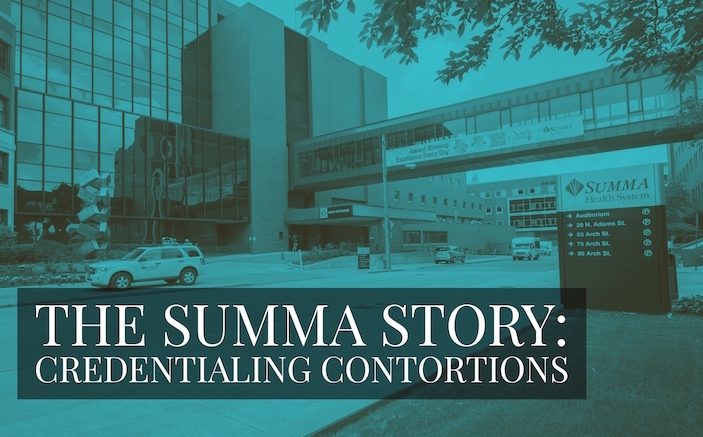I want to focus on two overlooked aspects of this SEA/Summa debacle – an odd bureaucratic quirk, and the resurgence of independent social media.
First, the bureaucracy. Everyone has seen staffing shortages made worse, because of delays in hospital credentialing and EHR training. Even if someone is hired months in advance, and all the paperwork is submitted in a timely fashion, there’s often a mad dash to complete the credentialing process, and get a new attending an EHR login and password in time for the first scheduled shift. The typical explanation is regulatory agencies like NCQA and the Joint Commission insist on a rigorous process for background checks, verifying privileges, and credentialing – it’s a process that usually takes many weeks, and even personal phone entreaties from the hospital leadership can only do so much. Even innovative startups like CredSimple can’t promise better than 5 business days turnaround time.
So I’m puzzled by how dozens of doctors from USACS were credentialed between Christmas and New Year’s Day (it’s even stranger that the head of Summa’s credentialing committee told the press he hadn’t seen any new files cross his desk, as of 12/29/16. Emergency credentialing is possible, in the event of declared disasters – but I don’t think that was what happened here.
We also know from eyewitness reports that none of the new doctors were allowed to access Summa’s EHR – in the early days of the transition, the USACS providers were charting and place their orders on paper. At least this makes sense to me – IT likes to follow procedure too, and so they often don’t release logins and passwords until training is complete. And while IT’s process isn’t as onerous as credentialing, are more hospitals allow web-based learning, there are still many places that require 4-8 hours of in-person, classroom training before allowing nurses or providers to use the EHR. It’s just odd: Summa leadership seemed to move heaven and earth to get through the heavily regulated credentialing process, but they couldn’t manage to get IT training done in time.
The other remarkable aspect of the Summa situation is the re-assertion that social media could be a force for transparency and discussion. We’ve heard a lot about the “bubble” since the presidential election – too many people getting their news exclusively from shared articles and comments through their Facebook network. Because of these distorted viewpoints in the bubble, we end up with things like fake news, trolls, and increasing polarization.
Social media didn’t use to be this way! In the early 2000’s, Emergency Medicine bloggers like GruntDoc blazed a trail, describing their jobs, workplace challenges, tough cases, and policy views. As a medical student at that time, I found the discussions really insightful (and remarkably troll-free and polite). It seemed like an open, tolerant, enlightening environment – the opposite of a bubble. Even as the blogging community was co-opted by multi-billion dollar companies and mainstream media, folks like GruntDoc stayed independent, and never stopped thinking, writing and sharing.
This is why I was heartened to see GruntDoc.com hosting the first SEA doctor’s account of what went down at Summa. It galvanized the EM community, and GruntDoc’s comments section lit up: over 250 comments from Summa nurses, residents and graduates, even patients, and quickly even the CEOs of Summa Health and USACS. They were all trying to apply their spin, but they were out there, engaging their critics and sharing their perspective.
Sure, there were other online conversations about Summa – on Reddit, Facebook and Twitter, as well as EM listservs and the comments section of Akron Beacon Journal articles. But it was GruntDoc.com that served as the vital center of discussion. If you had a stake in Summa, if you cared about it, you went on GruntDoc. It shows me that independent blogging isn’t dead, and still has a role to play, in 2017.
Click here to read more from the Deal Breakers: The Summa Story series.








